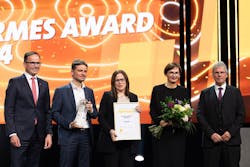2D Grasping Kit earns 2024 Hermes Award
German company Schunk won the Hermes Award at the ceremonial opening of Hannover Messe on April 21, in recognition of a project based on artificial intelligence (AI). Germany Minister of Education and Research Bettina Stark-Watzinger presented the award in the presence of Federal Chancellor Olaf Scholz and Norwegian Prime Minister Jonas Gahr Støre.
A jury chaired by Prof. Dr.-Ing. Holger Hanselka, president of the Fraunhofer-Gesellschaft, selected Schunk's 2D Grasping Kit project for this year's award. This application kit comprises a camera with lens, an industrial PC, AI software and an application-specific gripper. The innovative nature of the project lies in the generic, AI-based modeling of component variants and the transfer to a smaller training data set, which cuts learning times for recognition. Even under changing light, color or background conditions, the user interface enables picking and handling of randomly arranged and non-positioned parts from an infeed conveyor belt, tray or preparation table. This allows repetitive sorting or logistics tasks to be automated.
"Automation is the key to the future for supplying people and industry in our country,” said Hanselka. “Only with sustainable innovations, especially in the spheres of production and logistics, can we successfully master the economic and social challenges of tomorrow. Besides ease of use, the robustness of the development for many of the upcoming automation solutions was a particularly decisive factor behind our decision to select the 2D Grasping Kit for this award. On behalf of the entire jury, I am delighted to congratulate Schunk on winning the Hermes Award 2024."
Deutsche Messe has honored a company with the Hermes Award at each edition of Hannover Messe for more than 20 years. The prize acknowledges a product that demonstrates a notably high level of technological innovation. Market maturity is a crucial criterion in the jury's decision.
This year, Hannover Messe’s theme of Industrial Transformation brings together exhibiting companies from the mechanical engineering, electrical engineering and digital industries, as well as the energy sector. Key topics include Industry 4.0/Manufacturing-X, energy for industry, digitalization/artificial intelligence and machine learning, carbon-neutral production and hydrogen and fuel cells. Norway is this year’s partner country.

